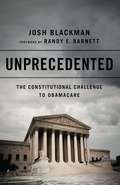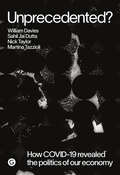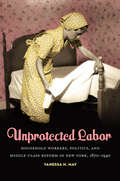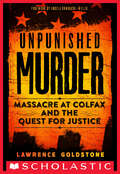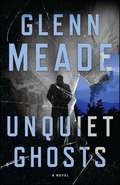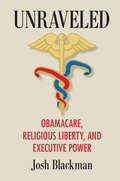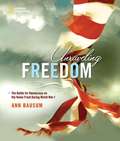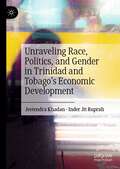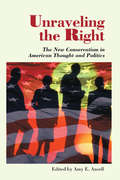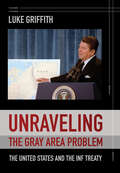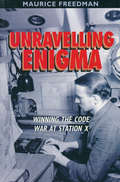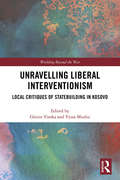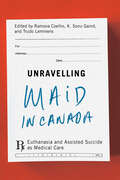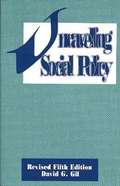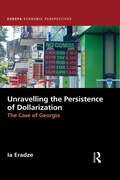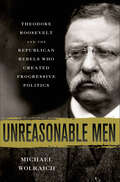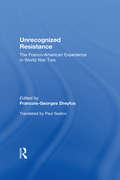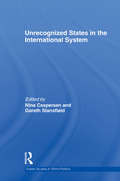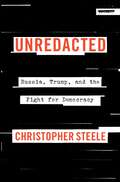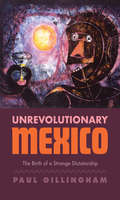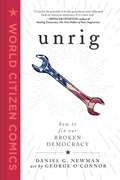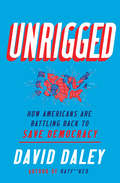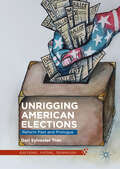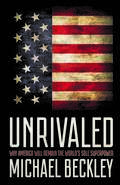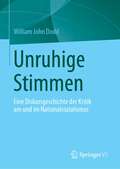- Table View
- List View
Unprecedented: The Constitutional Challenge to Obamacare
by Randy E. Barnett Josh BlackmanIn 2012, the United States Supreme Court became the center of the political world. In a dramatic and unexpected 5-4 decision, Chief Justice John Roberts voted on narrow grounds to save the Affordable Care Act, commonly known as Obamacare. Unprecedented tells the inside story of how the challenge to Obamacare raced across all three branches of government, and narrowly avoided a constitutional collision between the Supreme Court and President Obama. <p><p> On November 13, 2009, a group of Federalist Society lawyers met in the Mayflower Hotel in Washington, D.C., to devise a legal challenge to the constitutionality of President Obama's "legacy" — his healthcare reform. It seemed a very long shot, and was dismissed peremptorily by the White House, much of Congress, most legal scholars, and all of the media. Two years later the fight to overturn the Affordable Care Act became a political and legal firestorm. When, finally, the Supreme Court announced its ruling, the judgment was so surprising that two cable news channels misreported it and announced that the Act had been declared unconstitutional. <p> Unprecedented offers unrivaled inside access to how key decisions were made in Washington, based on interviews with over one hundred of the people who lived this journey — including the academics who began the challenge, the attorneys who litigated the case at all levels, and Obama administration attorneys who successfully defended the law. It reads like a political thriller, provides the definitive account of how the Supreme Court almost struck down President Obama's "unprecedented" law, and explains what this decision means for the future of the Constitution, the limits on federal power, and the Supreme Court.
Unprecedented?: How COVID-19 Revealed the Politics of Our Economy (Goldsmiths Press / PERC Papers)
by Nick Taylor William Davies Martina Tazzioli Sahil Jai DuttaA critical and evidence-based account of the COVID-19 pandemic as a political–economic rupture, exposing underlying power struggles and social injustices.The dawn of the COVID-19 pandemic represented an exceptional interruption in the routines of work, financial markets, movement across borders and education. The policies introduced in response were said to be unprecedented—but the distribution of risks and rewards was anything but. While asset-owners, outsourcers, platforms and those in spacious homes prospered, others faced new hardships and dangers. Unprecedented? explores the events of 2020-21, as they afflicted the UK economy, as a means to grasp the underlying dynamics of contemporary capitalism, which are too often obscured from view. It traces the political and cultural contours of a "rentier nationalism," that was lurking prior to the pandemic, but was accelerated and illuminated by COVID-19. But it also pinpoints the contradictions and weaknesses of this capitalist model, and the new sources of opposition that it meets. An empirical, accessible and critical analysis of the COVID economy, Unprecedented? is essential reading for anyone seeking to understand the political and economic turbulence of the pandemic&’s first eighteen months.
Unprotected Labor: Household Workers, Politics, and Middle-class Reform in New York, 1870-1940
by Vanessa H. MayThrough an analysis of women's reform, domestic worker activism, and cultural values attached to public and private space, Vanessa May explains how and why domestic workers, the largest category of working women before 1940, were excluded from labor protections that formed the foundation of the welfare state. Looking at the debate over domestic service from both sides of the class divide, Unprotected Labor assesses middle-class women's reform programs as well as household workers' efforts to determine their own working conditions. May argues that working-class women sought to define the middle-class home as a workplace even as employers and reformers regarded the home as private space. The result was that labor reformers left domestic workers out of labor protections that covered other women workers in New York between the late nineteenth century and the New Deal. By recovering the history of domestic workers as activists in the debate over labor legislation, May challenges depictions of domestics as passive workers and reformers as selfless advocates of working women. Unprotected Labor illuminates how the domestic-service debate turned the middle-class home inside out, making private problems public and bringing concerns like labor conflict and government regulation into the middle-class home.
Unpunished Murder: Massacre at Colfax and the Quest for Justice
by Lawrence GoldstoneHow the Supreme Court turned a blind eye on justice, stripped away the equal rights promised to all Americans, and ushered in the era of Jim Crow.On Easter Sunday of 1873, just eight years after the Civil War ended, a band of white supremacists marched into Grant Parish, Louisiana, and massacred over one hundred unarmed African Americans. The court case that followed reached the highest court in the land. Yet, following one of the most ghastly incidents of mass murder in American history, not one person was convicted.The opinion issued by the Supreme Court in US v. Cruikshank set in motion a process that would help create a society in which Black Americans were oppressed and denied basic human rights—legally, according to the courts. These injustices paved the way for Jim Crow and would last for the next hundred years. Many continue to exist to this day.In this compelling and thoroughly researched volume for young readers, Lawrence Goldstone traces the evolution of the law and the fascinating characters involved in the story of how the Supreme Court helped institutionalize racism in the American justice system.“Spotlighting an event seldom discussed in books for young people, Goldstone provides a complex, useful historical context for understanding issues surrounding race and justice.” —Booklist (starred review)“A unique look at not only the massacre in question, but also at the history and workings of the Supreme Court of the United States.” —School Library Connection“The book is, in large part, the story of how racism evolves, persisting in laws and politics despite major social advances.” —The Horn Book (starred review)
Unquiet Ghosts: A Novel
by Glenn Meade“Powerful, moving...unforgettable.” —Janet Evanovich, #1 New York Times bestselling author “Glenn Meade doesn’t miss a beat…A high-octane game-changer.” —Steve Berry, New York Times bestselling author of The 14th Colony Eight years ago, her husband and children were killed in a plane crash. Now, new evidence reveals that they didn’t die—her husband deliberately vanished—and that he knows a secret the powerful forces will stop at nothing to keep hidden.Kathy Kelly’s world was shattered when a plane carrying her husband—an Iraq War veteran and devoted father—and her two children vanished from the sky one night. No trace of the plane was ever found. Eight years later, Kathy has struggled to rebuild her life, but then wreckage of his plane is found in the wilderness of Great Smoky Mountain National Park—hundreds of miles from where her husband’s plane should have been. The pilot perished in the crash, but there is no sign of Jack or the children. Could they have made it out alive after all? But if so, where have they been all this time? Where are they now? As Kathy searches for any clue about what happened to her family, the investigation uncovers some unsettling clues—including a briefcase containing millions of dollars in cash, a priceless mask stolen from an Iraqi museum, and a clue that links Jack’s disappearance with the suspicious death of Kathy’s mother years ago. But she soon learns that others have been looking for the wreckage and its occupants for a long time. Others who are determined to make sure she never finds her family and that they remain dead. Shadowy, powerful people who will kill for what was on board—a secret her husband was the keeper of. A secret so powerful it will open a Pandora’s box of bloody revenge—one that reaches back into the past and into the highest echelons of wealth and power, all the way to the White House. This breathless, pulse-pounding thriller examines the very real billions in cash and priceless artifacts that vanished into the pockets of powerful American men during the Iraq war, and examines the extreme lengths some people will go to protect the secrets of what really happened to all that money.
Unraveled
by Josh BlackmanSix years after its enactment, Obamacare remains one of the most controversial, divisive, and enduring political issues in America. In this much-anticipated follow-up to his critically acclaimed Unprecedented: The Constitutional Challenge to Obamacare (2013), Professor Blackman argues that, to implement the law, President Obama has broken promises about cancelled insurance policies, exceeded the traditional bounds of executive power, and infringed on religious liberty. At the same time, conservative opponents have stopped at nothing to unravel Obamacare, including a three-week government shutdown, four Supreme Court cases, and fifty repeal votes. This legal thriller provides the definitive account of the battle to stop Obamacare from being 'woven into the fabric of America'. Unraveled is essential reading to understand the future of the Affordable Care Act in America's gridlocked government in 2016, and beyond.
Unraveling Freedom: The Battle for Democracy on the Home Front during World War I
by Ann Bausum"In 1915, the United States experienced the 9/11 of its time. A German torpedo sank the Lusitania killing nearly 2,000 innocent passengers. The ensuing hysteria helped draw the United States into World War I--the bitter, brutal conflict that became known as the Great War and the War to End All Wars. But as U.S. troops fought to make the world safe for democracy abroad, our own government eroded freedoms at home, especially for German-Americans. Free speech was no longer an operating principle of American democracy. Award-winning author Ann Bausum asks, just where do Americans draw the line of justice in times of war? Drawing thought-provoking parallels with President Wilson's government and other wartime administrations, from FDR to George W. Bush, Bausum's analysis has plenty of history lessons for the world today. Her exhaustive research turns up astonishing first-person stories and rare images, and the full-color design is fresh and stunning. The result is a gripping book that is well-positioned for the run-up to the World War I centennial."
Unraveling Race, Politics, and Gender in Trinidad and Tobago’s Economic Development
by Jeetendra Khadan Inder Jit RuprahThis book delves into Trinidad and Tobago's development with a fresh lens. It stands as the inaugural empirical exploration of the country's unique attributes, including its diversity, ex-British colony status, small-state categorization by population size, and its dependence on hydrocarbons.Through meticulous empirical analysis, this book scrutinizes the nation's economic, social, and political outcomes within the context of these four distinctive parameters, offering fresh insights into the country's development trajectory.What sets this book apart is its unwavering commitment to a data-driven approach. Drawing upon a vast array of databases from both international and national sources, it provides a thorough examination of development indicators, household welfare metrics, firm-level performance, and individual perspectives on a wide range of political, economic, and social issues.For scholars, policymakers, and anyone with an interest in understanding how unique contextual factors shape a Trinidad and Tobago's development, this book offers an enlightening and data-rich perspective on the nation's journey towards progress and prosperity.
Unraveling The Right: The New Conservatism In American Thought And Politics
by Amy AnsellThis book focuses on an alternative perspective on the relevance of today's conservatism in American thought and politics. It analyzes the most central and most significant public issues confronting our society at the end of the twentieth century.
Unraveling the Gray Area Problem: The United States and the INF Treaty
by Luke GriffithIn Unraveling the Gray Area Problem, Luke Griffith examines the US role in why the Intermediate-Range Nuclear Forces (INF) Treaty took almost a decade to negotiate and then failed in just thirty years. The INF Treaty enhanced Western security by prohibiting US and Russian ground-based missiles with maximum ranges of 500 to 5,500 kilometers. Significantly, it eliminated hundreds of Soviet SS-20 missiles, which could annihilate targets throughout Eurasia in minutes. Through close scrutiny of US theater nuclear policy from 1977 to 1987, Griffith describes the Carter administration's masterminding of the dual-track decision of December 1979, the North Atlantic Treaty Organization (NATO) initiative that led to the INF Treaty. The Reagan administration, in turn, overcame bureaucratic infighting, Soviet intransigence, and political obstacles at home and abroad to achieve a satisfactory outcome in the INF negotiations. Disagreements between the US and Russia undermined the INF Treaty and led to its dissolution in 2019. Meanwhile, the US is developing a new generation of ground-based, INF-type missiles that will have an operational value on the battlefield. Griffith urges policymakers to consider the utility of INF-type missiles in new arms control negotiations. Understanding the scope and consistency of US arms control policy across the Carter and Reagan administrations offers important lessons for policymakers in the twenty-first century.
Unravelling Enigma: Winning The Code War At Station X (Military History Ser.)
by Maurice FreedmanSeldom out of the news for long, code-breaking has had a bad time in the media so far, readers and viewers often finding it as perplexing as it is intriguing. As one of the greatest achievements of the century, code- breaking is a fascinating story, but all too often misunderstood and felt to be obscure. The author covers the story from the early code-breaking efforts through the rickety structure of the pre-war Government Code and Cypher School to Bletchley Park where a large powerful organisation arose, unscrambling thousands of secret enemy messages every day. Detailing how these amazing discoveries were actually used, taking us briefly into some of the battles of the Second World War, and in some detail the Battle of the Atlantic, when Britain was in danger of starving and where the war was nearly lost.For the first time, the code-breaking story with all its complexities is told in a straightforward and readable manner, whilst at the same time it will not fail to intrigue and astonish readers.
Unravelling Liberal Interventionism: Local Critiques of Statebuilding in Kosovo (Worlding Beyond the West)
by Gëzim Visoka Vjosa MusliuDespite calls for the decolonisation of knowledge, scholars who come from conflict-affected societies remained marginalised, excluded from the examination of the politics and impacts of liberal interventionism. This edited volume gives local scholars a platform from which they critically examine different aspects of liberal interventionism and statebuilding in Kosovo. Drawing on situational epistemologies and grounded approaches, the chapters in this book interrogate a wide range of themes, including: the politics of local resistance; the uneven relationship between international statebuilders and local subjects; faking of local ownership of security sector reform and the rule of law; heuristic and practical limits of interventionism, as well as the subjugated voices in statebuilding process, such as minorities and women. The book finds that the local is not antidote to the liberal, and that local perspectives are not monolithic. Yet, local critiques of statebuilding do not seek to generate replicable knowledge; rather they prefer generating situational and context-specific knowledge be that to resolve problems or uncover the unresolved problems. The book seeks to contribute to critical peace and conflict studies by (re)turning the local turn to local scholars who come from conflict-affected societies and who have themselves experienced the transition from war to peace. This book is essential reading for students and scholars of peace- and state-building, conflict studies and international relations.
Unravelling MAiD in Canada: Euthanasia and Assisted Suicide as Medical Care
by Trudo Lemmens Ramona Coelho K. Sonu GaindSince legalizing euthanasia and assisted suicide as medical assistance in dying (MAiD) in 2016, Canada has witnessed an internationally unprecedented expansion of the practice, making it the country with the highest number of MAiD deaths.Initially introduced to relieve suffering in a broad end-of-life context, the law expanded quickly to make MAiD available to disabled Canadians not approaching their natural deaths. MAID will also become legal for sole reasons of mental illness sometime after 2027, and there are plans to expand it further to include minors and advance requests. From a cross-disciplinary perspective, including contributions from authors with lived experience, Indigenous perspectives, and expertise in medicine, mental health, disability, law, and ethics, Unravelling MAiD in Canada challenges readers with the ethical, medical, legal, societal, and disability justice rights concerns that have arisen in regard to this hotly debated irreversible practice.Canada now provides more state-facilitated euthanasia and assisted suicide than any other country. This volume puts forth critical reflections and valuable insights as more jurisdictions consider their own assisted dying laws and policies.
Unravelling Social Policy: Theory, Analysis, and Political Action Towards Social Equality (5th edition, revised and enlarged)
by David G. GilDavid G. Gil's conceptual model consists of the identification of the common domain of social policies and their key processes.
Unravelling The Persistence of Dollarization: The Case of Georgia (Europa Economic Perspectives)
by Ia EradzeThis volume engages with the roots, dimensions, and implications of foreign currency domination in states with a national currency. Referred to as unofficial dollarization in literature, this is a worldwide phenomenon among developing countries and has a long history. This monograph provides a political economic analysis of dollarization in Georgia and is structured around three themes: the genesis of dollarization (1991–2003), the persistence of dollarization (2003–12) and the politicization of dollarization (2012–19). The case of Georgia is especially representative of the post-socialist transition states, but also has wider applicability. A high level of dollarization is a significant barrier to economic growth, macroeconomic and political stability, functional monetary policy, as well as social welfare. The Covid-19 crisis and the increasing debt of developing countries in foreign currency exacerbate dollarization-related vulnerabilities for these economies. This book will be of interest to postgraduate students in global/comparative political economy, development economics or transition economies, researchers in monetary sovereignty, central banking, exchange rate policies, currency hierarchy, money, financialization, and policy makers in dollarized countries and global institutions.
Unreasonable Men: Theodore Roosevelt and the Republican Rebels Who Created Progressive Politics
by Michael WolraichAt the turn of the twentieth century, the Republican Party stood at the brink of an internal civil war. After a devastating financial crisis, furious voters sent a new breed of politician to Washington. These young Republican firebrands, led by "Fighting Bob" La Follette of Wisconsin, vowed to overthrow the party leaders and purge Wall Street's corrupting influence from Washington. Their opponents called them "radicals," and "fanatics." They called themselves Progressives.President Theodore Roosevelt disapproved of La Follette's confrontational methods. Fearful of splitting the party, he compromised with the conservative House Speaker, "Uncle Joe" Cannon, to pass modest reforms. But as La Follette's crusade gathered momentum, the country polarized, and the middle ground melted away. Three years after the end of his presidency, Roosevelt embraced La Follette's militant tactics and went to war against the Republican establishment, bringing him face to face with his handpicked successor, William Taft. Their epic battle shattered the Republican Party and permanently realigned the electorate, dividing the country into two camps: Progressive and Conservative.Unreasonable Men takes us into the heart of the epic power struggle that created the progressive movement and defined modern American politics. Recounting the fateful clash between the pragmatic Roosevelt and the radical La Follette, Wolraich's riveting narrative reveals how a few Republican insurgents broke the conservative chokehold on Congress and initiated the greatest period of political change in America's history.
Unrecognized Resistance: The Franco-American Experience in World War Two
by Paul SeatonAt a time of differing perceptions of and frayed relations between the historic alliance between France and the United States, this volume merits the attention of serious people in government service and a wider public. It describes deeds of enormous courage, performed at great risk, in a time of crisis. The behavior of American soldiers and intelligence officers, and the extraordinary support from ordinary French men and women in Nazi-occupied France during World War II, is a story too little remembered today, and even less frequently told. This volume is an edited summary of what transpired at a unique colloquium held in the Salle Mdicis of the Palais du Luxembourg in Paris in December 2000, and hosted by the president of the French Senate.
Unrecognized States in the International System: The Struggle For Sovereignty In The Modern International System (Exeter Studies in Ethno Politics)
by Gareth Stansfield Nina CaspersenUnrecognized states are territories that have achieved de facto independence, yet have failed to gain international recognition as independent states. These territories constitute anomalies in the international system of sovereign states and often present significant challenges to policy makers, as evidenced by the war in Georgia and the continued debate over Kosovo’s independence. This book draws on both theory and case studies to better understand the phenomenon of unrecognized states, demonstrating that the existence of such entities is less unusual than previously assumed. Moving away from an overt focus on case studies, the chapters present various themes that link the emergence, operations, and development of unrecognized states and assess how the established order of states responds to the challenges they present: How do unrecognized interact with the international system of sovereign states? How does it shape their emergence, operations and development? How do these entities develop in a context of non-recognition? Are we witnessing a new form of statehood, or are these entities better understood as states-in-waiting? What are the strategies available for dealing with unrecognized states? Could power-sharing or autonomy provide a solution or are more innovative strategies necessary? With contributions from leading scholars in a number of fields, this book will appeal not only to students and scholars of Political Science, International Relations, Geography, Area Studies, Sociology, and Conflict Resolution, but also to journalists, government bodies and NGOs.
Unredacted: Russia, Trump, and the Fight for Democracy
by Christopher SteeleThe intelligence officer behind the explosive “Steele Dossier” steps out of the shadows, revealing a searing new report on the threat Putin and Trump pose to democracy, based on alarming intelligence exposed in these pages for the first time“Putin is now desperate to have Donald Trump back in the White House. If he succeeds in helping Trump get reelected, I am convinced that the global political order will be utterly changed. We shall have entered a new historical era of strategic chaos, a ‘new world disorder.’ The consequences of Trump winning the 2024 election are catastrophic.” –from UnredactedTo a unique degree, Christopher Steele has been an eyewitness observer of modern Russian history. He was a British diplomat and intelligence professional in Moscow when the Soviet Union was collapsing. Steele was there when the putsch against Mikhail Gorbachev took place and when Boris Yeltsin took over the newly independent Russia. After Vladimir Putin came to power, Steele rose to become one of British government’s leading Russia experts and played a central role in the investigation into the Kremlin-ordered murder of Alexander Litvinenko. Then, in 2016, he wrote a series of explosive reports about the then presidential candidate Donald Trump and his links to Russia. Now known to the world as the “Steele Dossier,” these intelligence documents drew the world’s attention to Russia’s relationship with Trump—and reluctantly thrust Steele into the center of a global maelstrom. Since Trump’s election, he has quietly continued his work. Indeed, Steele has had even better access to sources of information and intelligence on Russia—ones that have given him a privileged view of what’s going on inside the Kremlin, and how much we in the West should worry about it. In Unredacted, Steele shares for the first time what that inside view looks like, how he came to the point of gaining such a level of insight, and what Western governments—and all of us—can and should do to counter this generational threat.
Unrevolutionary Mexico: The Birth of a Strange Dictatorship
by Paul GillinghamAn essential history of how the Mexican Revolution gave way to a unique one-party state In this book Paul Gillingham addresses how the Mexican Revolution (1910–1940) gave way to a capitalist dictatorship of exceptional resilience, where a single party ruled for seventy-one years. Yet while soldiers seized power across the rest of Latin America, in Mexico it was civilians who formed governments, moving punctiliously in and out of office through uninterrupted elections. Drawing on two decades of archival research, Gillingham uses the political and social evolution of the states of Guerrero and Veracruz as starting points to explore this unique authoritarian state that thrived not despite but because of its contradictions. Mexico during the pivotal decades of the mid-twentieth century is revealed as a place where soldiers prevented military rule, a single party lost its own rigged elections, corruption fostered legitimacy, violence was despised but decisive, and a potentially suffocating propaganda coexisted with a critical press and a disbelieving public.
Unrig: How to Fix Our Broken Democracy (World Citizen Comics)
by Daniel G. NewmanAn intriguing and accessible nonfiction graphic novel about the role wealth and influence play in American democracy.Despite our immense political divisions, Americans are nearly united in our belief that something is wrong with our government: It works for the wealthy and powerful, but not for anyone else. Unrig exposes the twisted roots of our broken democracy and highlights the heroic efforts of those unrigging the system to return power to We the People.This stirring nonfiction graphic novel by democracy reform leader Daniel G. Newman and artist George O’Connor takes readers behind the scenes—from the sweaty cubicles where senators dial corporate CEOs for dollars, to lavish retreats where billionaires boost their favored candidates, to the map rooms where lawmakers scheme to handpick their voters. Unrig also highlights surprising solutions that limit the influence of big money and redraw the lines of political power.If you're overwhelmed by negative news and despairing for the direction of our country, Unrig is a tonic that will restore your faith and reveal the path forward to fix our broken democracy.
Unrigged: How Americans Are Battling Back To Save Democracy
by David DaleyA revelatory account by the best- selling author of Ratf**ked that will give you hope that America’s fragile democracy can still be saved. Following Ratf**ked, his “extraordinary timely and undeniably important” (New York Times Book Review) exposé of how a small cadre of Republican operatives rigged American elections, David Daley emerged as one of the nation’s leading authorities on gerrymandering. In Unrigged, he charts a vibrant political movement that is rising in the wake of his and other reporters’ revelations. With his trademark journalistic rigor and narrative flair, Daley reports on Pennsylvania’s dramatic defeat of a gerrymander using the research of ingenious mathematicians and the Michigan millennial who launched a statewide redistricting revolution with a Facebook post. He tells the stories of activist groups that paved the way for 2018’s historic blue wave and won crucial battles for voting rights in Florida, Maine, Utah, and nationwide. In an age of polarization, Unrigged offers a vivid portrait of a nation transformed by a new civic awakening, and provides a blueprint for what must be done to keep American democracy afloat.
Unrigging American Elections: Reform Past and Prologue (Elections, Voting, Technology)
by Dari Sylvester TranThis critical and systematic analysis of election reforms post-HAVA (Help America Vote Act of 2002) offers a detailed look ahead at the significant challenges that remain in the context of a new presidential administration. Employing a mixed methodological approach, this book analyzes the biggest election challenges faced by voters and election administrators in the areas of voter registration, polling place and non-polling place voting, election administration personnel, and voting technology. Within the framework of the competing values of integrity and access, this book fills a crucial gap in the existing literature by analyzing the impact of election reform wins and losses. The book concludes with a promising agenda for the future of election reform and the political considerations that will be brought to bear on that agenda.
Unrivaled: Why America Will Remain the World's Sole Superpower (Cornell Studies in Security Affairs)
by Michael BeckleyThe United States has been the world's dominant power for more than a century. Now many analysts believe that other countries are rising and the United States is in decline. Is the unipolar moment over? Is America finished as a superpower?In this book, Michael Beckley argues that the United States has unique advantages over other nations that, if used wisely, will allow it to remain the world's sole superpower throughout this century. We are not living in a transitional, post-Cold War era. Instead, we are in the midst of what he calls the unipolar era—a period as singular and important as any epoch in modern history. This era, Beckley contends, will endure because the US has a much larger economic and military lead over its closest rival, China, than most people think and the best prospects of any nation to amass wealth and power in the decades ahead.Deeply researched and brilliantly argued, this book covers hundreds of years of great power politics and develops new methods for measuring power and predicting the rise and fall of nations. By documenting long-term trends in the global balance of power and explaining their implications for world politics, the book provides guidance for policymakers, businesspeople, and scholars alike.
Unruhige Stimmen: Eine Diskursgeschichte der Kritik am und im Nationalsozialismus
by William John DoddIn dieser Diskursgeschichte analysiert W. J. Dodd die "unruhigen Stimmen" von Gegnern, deren zeitgenössische Kritik am Nationalsozialismus sich aus Positionen des territorialen und inneren Exils auf die "Sprache des Nationalsozialismus" konzentrierte. Die einzelnen Kapitel befassen sich mit den "Vorläufer"-Diskursen, dem öffentlichen Diskurs der Nazis von 1933 bis 1945, den Zeugnissen der "unruhigen Stimmen" im Ausland sowie in privaten und veröffentlichten Texten im "Reich", den Versuchen zur "Entnazifizierung der Sprache" (1945-49) und den Hinterlassenschaften der Nazi-Vergangenheit in einem retrospektiven Diskurs der "Aufarbeitung" der Nazi-Vergangenheit. In der Zeit nach 1945 konzentriert sich das Buch auf die Anfechtung der "befleckten Sprache" und die Instrumentalisierung der NS-Vergangenheit sowie auf das Fortbestehen sprachlicher Tabus im zeitgenössischen deutschen Sprachgebrauch. Das Buch, das durchgehend in englischer Übersetzung vorliegt, ist eine unschätzbare Quelle für Wissenschaftler der Diskursanalyse, der Soziolinguistik und der deutschen Geschichte und Kultur sowie für Leser mit einem allgemeinen Interesse an Sprache und Politik.
